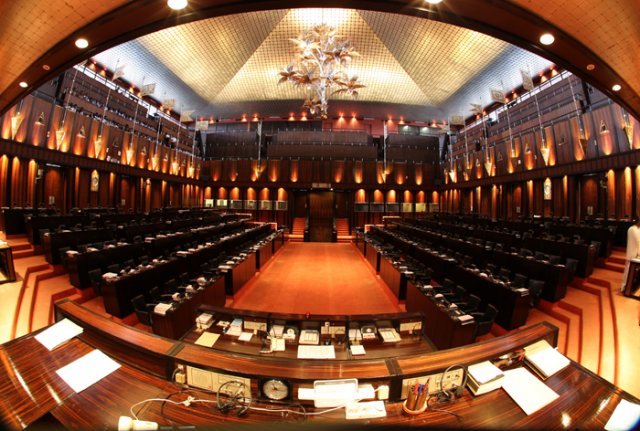 Sri Lanka's Parliament chamber. [photo: Parliament of Sri Lanka website]
Sri Lanka's Parliament chamber. [photo: Parliament of Sri Lanka website]
[This excerpt is from the introduction to a special issue of The Round Table: The Commonwealth Journal of International Affairs on Constitutional Reforms in Sri Lanka. Asanga Welikala outlines some of the themes in this issue.]
The constitutional status of Buddhism and the unitary self-description of the state are two aspects of constitutional reform in Sri Lanka that are as much about highly emotive symbols as they are about constitutional design and norms. Ayesha Wijayalath analyses the debates in the Constitutional Assembly and the proposals of the Steering Committee about the status of Buddhism in the light of the longer pedigree of this debate since independence. Sanjayan Rajasingham analyses the proposals in respect of replacing, reformulating, or retaining the constitutional classification of the state, which is again a constitutional controversy that has raged since well before independence and was at the root of the protracted armed conflict. He also draws attention to an interesting but ambivalent 2017 judgment of the Supreme Court concerning the principles of internal and external self-determination, sovereignty, territorial integrity, and federalism.
The proposals concerning a future bill of rights and its enforcement were some of the most extensive – and indeed relatively uncontentious – in the recent process, although as Dinesha Samararatne points out, the public debate about them was extremely limited, imbalanced because some issues generated much controversy while others were wholly ignored, and in no sense denoted the broad and meaningful social discourse about rights and duties that is needed if the bill of rights is to serve its transformational purpose. By contrast, the enactment of the Right to Information Act was one of the reform government’s signal successes. In Pasan Jayasinghe’s analysis, the Act’s design shows a high degree of conformity with international standards, but the challenges to the actual realisation of a revolution in information sharing still remain, and the Act itself may not be enough to change Sri Lanka’s entrenched culture of governmental secrecy.
In the last two articles, the Special Issue considers two policy concerns that can be described as relative failures. Sanjana Hattotuwa’s article on the relationship between social media and the politics of constitutional reform not only shines a light on a thoroughly under-researched subject in Sri Lankan scholarship, but also illuminates how the government, in undertaking constitutional reform, has consistently failed to understand the challenge of political communication in the social media age within a society with an electorally significant proportion of the population under the age of thirty-five. Likewise, Isabelle Lassée gives a comprehensive account of the importance of transitional justice in Sri Lanka’s post-war society, which ought to have been the parallel process to constitutional reform, but which was side-lined, and eventually virtually abandoned. This was due to a dichotomisation between the two processes which ought to have been conceived in complementary terms, yet primary importance was given to the latter.
Taken together, these articles offer a panoramic view of Sri Lanka’s latest attempt at constitutional reform. No claims are made to either finality or comprehensiveness, but they will give the reader a wealth of empirical information contextualised with authority by a group of experts who are in daily touch with the vagaries of political reform in Sri Lanka.
Dr Asanga Welikala is Lecturer in Public Law at the School of Law, University of Edinburgh, and the Acting Director of the Edinburgh Centre for Constitutional Law.
Special edition journal homepage
Related articles:
Sri Lanka: The Rajapaksas’ Return
Constitutional Contestation of Religion in Sri Lanka
Sri Lanka: The Nineteenth Amendment to the Constitution – from start to finish



